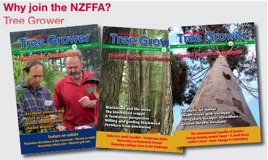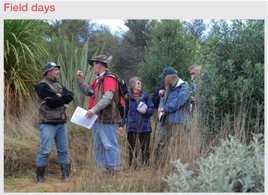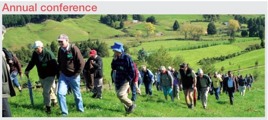Harvesting your woodlot requires quality access and decision-making
Tim Smith, New Zealand Tree Grower February 2013.
Having been involved in harvesting and marketing private forestry woodlots for close to 20 years, I have learned some very valuable lessons. Being based in south Otago, the home of farm forestry, where the likes of Vic Stephens and John Edmonds helped pioneer the movement several rotations ago, the challenges and problems which arise are generally the same.
To get the optimum value for your trees they must be well managed right from land preparation, establishment and silviculture, through to the eventual harvesting and marketing of the trees. This may sound straightforward, but I would suggest not too many get it right. Those who do clearly reap the benefits, which means higher returns for the effort made.
The old adage − if you are going to do it, then you might as well do it once and do it properly − applies without a doubt to farm foresters too. If I only had a dollar for every time I was told they were pruned on time or that the road has been there for years. The message here is maintain accurate records of what was done and when, so there is no debate and perhaps more importantly, no unfortunate consequences.
Access
Access is probably the most important problem facing farm foresters when it comes to logging their trees. Often we come across blocks where the cost of putting in a road or upgrading one can have a significant effect on net returns to the farm forester.
It all boils down to initial planning and foresight. Do not plant a hectare of trees at the back of the farm where there is no access and expect logging trucks to perform like a four-wheel drive tractor. A 45 tonne logging truck requires good access in every sense of the word. Logging roads can be expensive to build, so obviously the less you can spend here the better the return. Once again, do it once and do it properly.
A lack of good access generally means a lot of farm foresters hold off logging until the summer. In theory this is fine, but unfortunately you limit yourself to a small window of opportunity. You often miss higher prices or struggle to get your trees logged because everyone else is trying to do this at the same time.
Benefits of belter access
All year round access to the trees can have several benefits, particularly in winter. There are potentially extra costs in construction, but I would suggest the benefits more than outweigh the costs −
- If the market spikes then you are ready to take advantage
- You give yourself options to harvest your trees if you need to due to unforeseen circumstances
- Premiums are often paid for wood over the winter months because of potential supply problems
- Good all-weather access can also provide other benefits.
Building roads
If you have to build roads make sure you give yourself plenty of time, as operating on green roads is a risky proposition. Roads should preferably be constructed at least a year before logging, and make sure you build them to the required standard to support the safe passage of logging trucks.
Once again, do not underestimate what is required, and talk to the right people as it will potentially save you a lot of money and grief. Unfortunately, there are a number of farm foresters who I am sure could tell of their horror experiences and the money they had to spend to get trucks out because they tried to take short-cuts.
Local authorities
Another important consideration owners of small woodlots need to be aware of is their local authority requirements, in particular access to public roads and resource consent requirements. There are a number of bylaws and consent requirements which apply to forestry.
- Earthworks – depending on where you are and what you intend doing, you may require a consent
- Water – if you are crossing waterways or disturbing waterways there will be rules and regulations with regard to culvert sizes and run-off controls
- Log truck movements – depending on the amount of wood you intend to log can determine your obligations to the local authorities. You may be required to notify the council if you exceed 80 log truck movements a month, or to contribute to council road upgrades deemed necessary to support the logging operation.
All of these matters require early discussion and resolution with your local authority, so do not leave it too late.
Obligations, responsibilities and risks
As with any business decision there are attendant obligations, responsibilities and risks. It is important you are certain that you understand −
- What is involved before committing to harvest your woodlot
- The obligations, responsibilities and risk associated with everyone involved with the harvest, the woodlot owner, the logging contractor and the agent or whoever, need to be clearly identified, fully understood and preferably in writing as part of a contract
- What your woodlot contains in the way of harvestable volume and harvestable log grades
- The method of sale being promoted, such as lump sum, composite price or graded log sale, and do not be fooled by promises of extraordinary prices for particular log grades
- Those involved in harvesting your woodlot are proficient and professional, if in doubt seek references and ask around.
- As a final note of caution, if a deal sounds too good to be true, then it probably is.
Common sense, not rocket science
Do your homework and do it properly. It is not rocket science but common sense that should be applied when considering logging your trees. You have invested considerable time and expense in growing your woodlot over the last 25 to 30 years. Do not compromise at the eleventh hour.
Talk to people who have previously logged their trees as their experiences will be invaluable. If you are not sure about your obligations, whether they are environmental, iwi, legal or health and safety, then ask. Ignorance is neither an excuse nor a defence, and it could potentially come back to haunt you if you do not ask, as I am sure some people reading this will agree.
Most farm foresters only get one chance to log their trees, so I would strongly suggest you shop around when seeking harvesting and marketing proposals. Your diligence in doing so will be rewarded.
Tim Smith is a forestry manager at Southern Cross Forest Products Limited

 Farm Forestry New Zealand
Farm Forestry New Zealand

